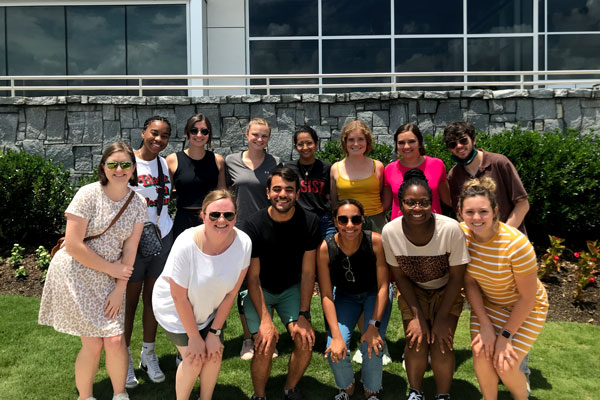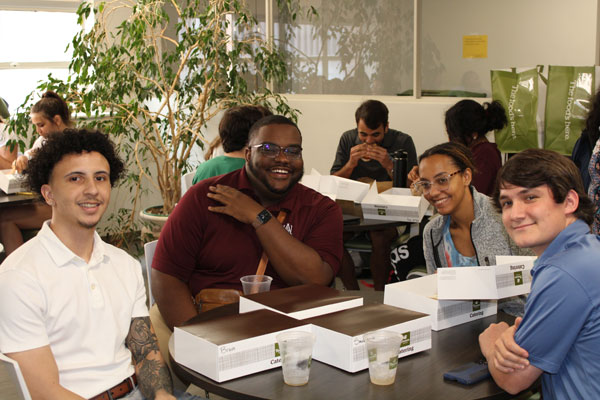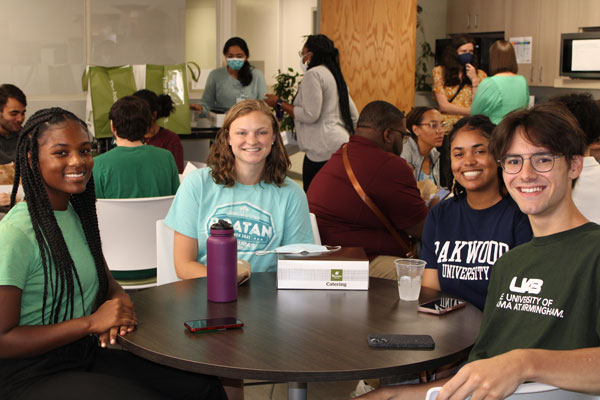 Jill Marsh, M.D., and CU2RE summer program students during their Montgomery, Ala. trip.This summer, 14 medical students from UAB Heersink School of Medicine’s four regional campuses share at least two characteristics: all are interested in primary care and all want to learn how to care for underserved communities. They comprise the second cohort of the Comprehensive Urban Underserved and Rural Experience (CU2RE) program in UAB's Department of Family and Community Medicine.
Jill Marsh, M.D., and CU2RE summer program students during their Montgomery, Ala. trip.This summer, 14 medical students from UAB Heersink School of Medicine’s four regional campuses share at least two characteristics: all are interested in primary care and all want to learn how to care for underserved communities. They comprise the second cohort of the Comprehensive Urban Underserved and Rural Experience (CU2RE) program in UAB's Department of Family and Community Medicine.
For eight weeks, these students, who had just finished their first year of medical school, are spending time together on their respective regional campuses enjoying in-person and virtual workshops, group activities and excursions. These activities include spending a day in Montgomery visiting several museums and exhibits devoted to the history of slavery, racism, and racism in medicine and participating in skills workshops exploring procedures in women's health and dermatology. Each student received a $20,000 stipend during their time in the CU2RE program and medical school.
The summer program is part of the larger CU2RE medical student program, which was created to support medical students interested in serving in areas of the state that lack adequate primary care. Several topics, including "interprofessional education, behavioral health, social determinants of health, cultural and linguistic competency, practice transformation, and telehealth," are covered in the curricular and clinical experiences that this program provides.
These six key areas are the foundation of a Health Resources and Services Administration grant that the UAB Department of Family and Community Medicine received in 2020. This $7 million grant allowed the department to launch the CU2RE program, which welcomed its first cohort later that year and its second cohort in 2021.

Jill Marsh, M.D., director of the Urban Underserved and Rural Pathways, said that participation from all campuses benefits every student in the program.
"It's not just something that we're doing solo here Birmingham. It's really partnering with the other campuses and their primary care folks that will enrich and sustain this program long-term and ultimately benefit patients all over the state," Marsh said.
All of the in-person, cohort-wide programming took place in a two-week block in Birmingham from June 21 – July 1. During these two weeks, students participated in several leadership sessions led by Michael Wiederman, Ph.D.
"In most communities and medical teams, a lot of times the physicians are looked at to be a leader of the team, so it's important that student-doctors are self-aware, learn to develop emotional intelligence and how to work with others on a team," Marsh said.
One of the summer program participants Amiria Blakely noted that she cherished the program’s lessons on self-awareness, patient awareness, developing a personalized leadership style and the art of tactfully leading patients through tough issues.
"These points are very important but are often overlooked during the first or second year(s) of medical school," Blakely explained. "I am beyond thankful for the opportunity to explore this in such detail."

Finally, the CU2RE summer program is also helping students gain clinical experience. CU2RE students provide care for a patient panel during their time in the program, and many begin meeting those patients for the first time this summer. Marsh said this opportunity allows the program's students to establish the long-term relationships that primary care doctors have with their patients, which she said is a key joy and value of the specialty of family medicine.
Blakely looks forward to improving in medical school and beyond because of the CU2RE summer program.
"This experience has granted me the opportunity to understand people and medicine from a more conscious and empathetic view." Blakely wrote. "I am learning how to be a better person and an effective leader, by utilizing my resources, and most importantly, better understanding others."
Incoming first-year medical students can apply to be part of the CU2RE program's third cohort starting August 2022.
Written by Ann Marie Stephens, Communications Intern, and Caroline Newman, Communications Director.